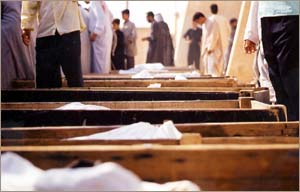 |
 |  |
|||||||
 |
Home | The Sunni Heartland | The Unexpected War | Paying the Price |
|||||||
|
Paying the Price Pockets of Tolerance, Evaporating Goodwill
James Dobbins, who managed the last five American-led nation building operations, remarks, "I think that there were elements of the people who were ready to greet the troops as liberators. Significant elements of the population, and there still are. "In a situation like this, in which the old regime has collapsed, what the population is looking for from the new sheriff, if you will, the U.S., is security. And if you're not offering them security, then you're an attractive nuisance...so we're loosing a lot of goodwill because we're not providing security and we're not providing security because we're not thick on the ground." Goodwill evaporated in the Shia Muslim community when a car bomb exploded in the city of Najaf, south of Baghdad, on August 27, 2003. NPR reporter Ivan Watson recorded the blast and the terrifying confusion in the moments afterwards. The explosion killed Ayatollah Mohammed Bakir Hakim, the leader of Iraq's largest Shia Muslim political movement. Ninety-five others died as well. Many Shias blamed U.S. forces for failing to bring security to a country they say is lawless; a rebuilding effort they say is adrift. It is a dangerous sign. |
||||||||
